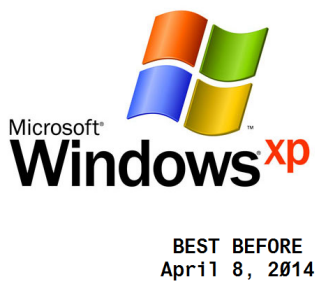Operating Systems DO have a 'best before' expiry date, and XP isn't past it ... yet!

The other day my blogging buddy Zack Whittaker had the idea that Microsoft should invoke some sort of kill-switch to get XP users to get users moving from XP up to Windows 7. Bad idea, for a number of reasons. Realizing that this move was unworkable, he then proposes that operating systems should have a 'best before' expiry date. Now, technically, operating systems do have a 'best before' date, it's just that most people aren't aware of that fact.
The purpose of a 'best before' date on food is to make sure that we don't endanger ourselves by eating something that's bad for us. Antique beans, super-furry cheese or lumpy milk might be 'obviously' bad, but some foods might be bad despite looking and smelling edible.
Note: Some also claim that the food industry uses 'best before' dates to move more stock (ad therefore make more money) by artificially giving food a short shelf life ... I'm no expert here other than being a survivor of eating 'expired' food on numerous occasions. YMMV.
Operating systems can also spoil over time. The most obvious kind of spoilage is where the OS no longer supports new hardware or software, making it a tech cul-de-sac. This sort of obsolescence sucks, but it's hardly the end of the world. After all, if you stick with old software and hardware, you'll be OK, right?
Wrong.
Operating systems (along with most software) have an expiry date. That date may or may not be written down, but it still exists. It's the date when the manufacturer stops releasing updates for the software, specifically security updates. Using the software beyond this point puts your digital well-being at risk.
Microsoft has already decided what the 'best before' date for Windows XP is - it's April 8th, 2014. It wasn't printed on the box, but maybe it should have been.

On this date product support, including all updates and hotfixes, will end. From this point onwards, using XP is like eating food that's past its expiry date ... it might be OK, but it might not be. And just as with food, the longer it is since the OS has expired, the greater the risk.
Now, there are a lot of people using XP out there in Computerland. Usage share puts XP at around 60%, which considering that the OS is two generations old is in incredible. Even with a few years to go, it's hard to see these usage numbers dropping to single digits by the expiry date. This raises an interesting question - will Microsoft tell people that their OS is past its 'best before' date? given the popularity of the OS, Microsoft should perhaps be thinking about some form of informational campaign to get people at least thinking about the expiration date.
There's a lot of XP hate amongst tech pundits. I can understand that. Personally I don't want to be running XP on any of my systems. That said, I can understand why people are still using it. Businesses have the turning circle of an aircraft carrier and change takes time and costs money. Home users on the other hand usually wait until for a new PC before upgrading the OS. Tech pundits and early adopters seem to forget that Windows 7 has only been available for little more than a year, and that unless you're an early adopter, that's not a long time.
Note: I know, I know, I'm leaving out Vista here. Let's just say that a big reason for the continued popularity of XP was down to Vista and the poor reception it had on launch. Microsoft dropped the ball with Vista, and paid the price. Time to move on from that.
I think that we can safely stop it with the "ZOMG XP IS SO OLD AND NEEDS REPLACING NOW!!!!" hyperventilation until at least April 2013. Sure, business need to be thinking about migration, but there's certainly no need to get into a panic about it.
Oh, and remember that there are people still using Windows 98 and ME out there (0.11% and 0.03% respectively). Now these OSes are WELL past their expiration date!